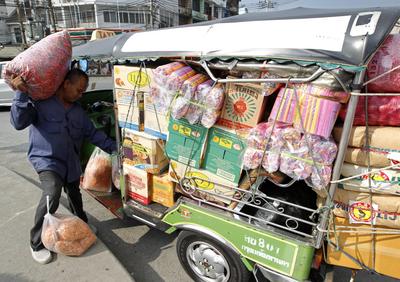| Year | 2013-06-12 |
|---|
 This was the message of a seminar entitled ‘Rethinking Populist Policy: From Thaksin to Yingluck’, held on 30 May at the Thailand Development Research Institute in Bangkok.
This was the message of a seminar entitled ‘Rethinking Populist Policy: From Thaksin to Yingluck’, held on 30 May at the Thailand Development Research Institute in Bangkok.
Under the Pheu Thai government of Prime Minister Yingluck Shinawatra, in office since September 2011, the form of populism implemented is different from that of her older brother, Thaksin Shinawatra, who was elected premier in 2001 and deposed by a military coup in 2006. Thaksin’s policies, such as the 30 baht health card scheme and the OTOP (One-Tambon-One-Product) entrepreneurship program, distributed benefits relatively broadly to low income Thai people. Yingluck’s government, on the other hand, has enacted new policies that redistribute wealth from taxpayers to narrow, special interest groups and not to the poor. Prime examples are the first-car buyers’ subsidy and an expanded rice pledging scheme. This change has occurred even though Thaksin still reportedly directs Pheu Thai policy remotely from his exile in Dubai.
The beneficiaries of the ‘first-car’ buyer subsidy are not the poor, who have no chance of purchasing a new car, but upper income groups. The scheme is widely abused, with wealthy new car buyers using proxy ‘first-car’ buyers to obtain the subsidy for themselves.
The rice pledging scheme uses taxpayer funds to subsidise government purchase of rice at prices 30 to 40 per cent above the market price. The benefit received by a farmer depends on the quantity of rice sold, not the quantity produced, some of which farmers consume themselves. The effect is that larger farmers, who sell the most, receive a disproportionate share of the benefits. Earlier research by the economist Nipon Poapongsakorn showed that warehouse owners and rice millers also benefit greatly, similarly at the taxpayers’ expense.
These populist interventions focus on short-term political benefits to the government, through gaining votes, and economic benefits to favoured special interests, while ignoring the need to craft long-term solutions to the country’s problems. For example, enhanced public investment in a mass-transit scheme would be a better use of taxpayers’ funds than the new car subsidy and would address the traffic congestion of cities like Bangkok, a problem only exacerbated by the encouragement to purchase new cars resulting from the subsidy. The bizarre car subsidy was reportedly introduced in response to requests from car manufacturers, including Mazda, for government help in stimulating demand for their products.
Thailand’s opposition parties have failed to compel the government to clarify the costs Yingluck’s policies impose on taxpayers. Taxpayers bear these costs. Thailand’s tax system is known to be regressive. Richer groups pay a smaller proportion of their incomes in tax than poorer groups. The absence of an effective income tax system, avoidance of company taxes, and reliance instead on indirect taxes, especially the value-added tax, is a central problem.
The lack of open discussion of the costs of populist policies is a concern not only from an economic policy standpoint but also for the quality of Thailand’s democracy. When Thai customers go to the supermarket, they know what costs to expect when buying this or that item. But the costs to the taxpaying (and voting) public of favoured government policies are systematically concealed.
In a recent controversy a Ministry of Finance official revealed that the budgetary cost of the rice pledging scheme has already exceeded 200 billion baht (about US$6.5 billion), about 10 per cent of annual government expenditure and 1.8 per cent of GDP. The government did not dispute the facts but the official was immediately relieved of her duties for having divulged the information.
Perhaps, in an open democratic system, there is nothing wrong with policy opportunism that calculates how many votes can be derived from any given initiative. But as the current populist policies work to redistribute income from taxpayers to special interest groups, the fact that Yingluck’s government, like Thaksin’s, hides the costs of the programs means that the normal checks and balances of democracy are obstructed. This restricts open public discussion of alternative policies and their effects on the public interest. Thailand badly needs to move beyond its divisive colour-politics of ‘red shirts’ versus ‘yellow shirts’ through more open public debate.
Peter Warr is Head of the Arndt-Corden Department of Economics, John Crawford Professor of Agricultural Economics, and Director of the Poverty Research Centre at the Crawford School of Public Policy, Australian National University.
_____________________________________
First published in East Asian Forum‘s website, 12th June 2013
